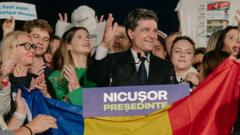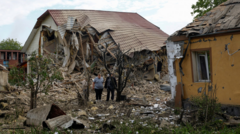In the recent discourse surrounding the Russia-Ukraine war, Vladimir Putin aims to extract favorable terms while facing significant economic challenges due to ongoing sanctions from the West.
Putin's Diplomatic Maneuvering in Ukraine: A Double-Edged Sword

Putin's Diplomatic Maneuvering in Ukraine: A Double-Edged Sword
As Russia's President navigates peace negotiations amid ongoing conflict, economic repercussions loom large.
The Kremlin continues to maintain a hardline stance on the situation in Ukraine, resisting calls for an immediate cease-fire as a precondition for peace talks. Since the invasion in February 2022, Putin has sought to secure a peace agreement that aligns with Russian interests, simultaneously continuing military operations which he perceives as advantageous.
In a recent phone conversation with U.S. President Trump, the possibility of resumed dialogue between Russia and Ukraine was discussed, with Trump signaling a shift away from his previous commitment to swiftly conclude the conflict. Trump emphasized that any economic normalization between the U.S. and Russia would hinge upon a peaceful resolution in Ukraine, intertwining the geopolitical and economic dimensions of the situation.
While Putin heralds a diplomatic win with America's willingness to engage in discussions, he could inadvertently jeopardize Russia’s economic aspirations. Trump’s comments suggest that unless a significant breakthrough occurs regarding peace, Russia may find itself in a prolonged state of economic isolation. The ramifications of this include continued Western sanctions that constrict trade and foreign investment, which Russia is keen to attract once hostilities cease.
Putin has publicly asserted that the Kremlin is not intimidated by potential new sanctions, claiming adaptability to the existing penalties. However, the potential for a prolonged economic standoff looms, as the prospect of significant trade relations with the U.S. remains elusive without advancing toward a resolution in Ukraine.
In summary, as diplomatic dialogues unfold, the intertwining of economic and political agendas presents both opportunities and hurdles for Russia, with Putin's ambitions hanging in a delicate balance.
In a recent phone conversation with U.S. President Trump, the possibility of resumed dialogue between Russia and Ukraine was discussed, with Trump signaling a shift away from his previous commitment to swiftly conclude the conflict. Trump emphasized that any economic normalization between the U.S. and Russia would hinge upon a peaceful resolution in Ukraine, intertwining the geopolitical and economic dimensions of the situation.
While Putin heralds a diplomatic win with America's willingness to engage in discussions, he could inadvertently jeopardize Russia’s economic aspirations. Trump’s comments suggest that unless a significant breakthrough occurs regarding peace, Russia may find itself in a prolonged state of economic isolation. The ramifications of this include continued Western sanctions that constrict trade and foreign investment, which Russia is keen to attract once hostilities cease.
Putin has publicly asserted that the Kremlin is not intimidated by potential new sanctions, claiming adaptability to the existing penalties. However, the potential for a prolonged economic standoff looms, as the prospect of significant trade relations with the U.S. remains elusive without advancing toward a resolution in Ukraine.
In summary, as diplomatic dialogues unfold, the intertwining of economic and political agendas presents both opportunities and hurdles for Russia, with Putin's ambitions hanging in a delicate balance.





















